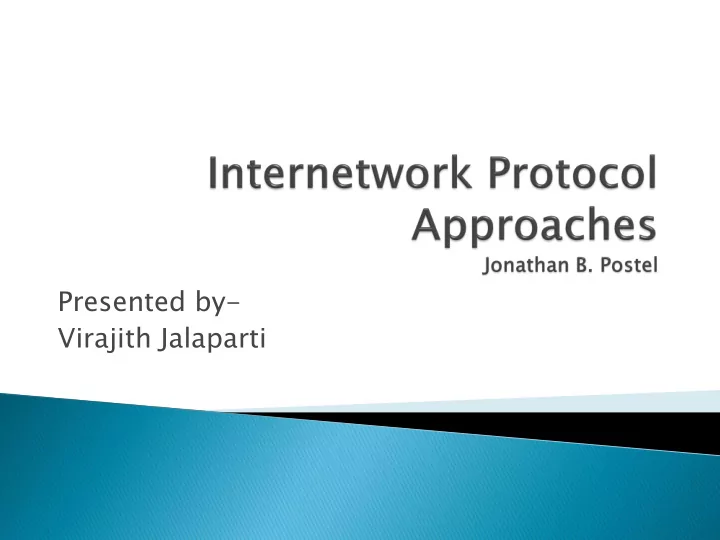

Presented by- Virajith Jalaparti
Inter-Process Gateway Open Systems Architecture Virtual Circuit – X.25 networks Datagram – APRA networks
Virtual Circuits Datagrams ◦ Reliable ◦ Unreliable ◦ Complicated ◦ Simpler ◦ Addressing depends ◦ Complete addressing on type of packet ◦ Just send data ◦ Setup-send data- ◦ Transaction type of connection tear down service ◦ Interactive computer systems
Based on type of connectivity provided Media Conversion Gateway ◦ Connects different link and physical protocols ◦ Provides Encapsulation and De-encapsulation ◦ Simpler Protocol translation Gateway ◦ Network and Transport layers bridged ◦ Might require address translation ◦ Packet semantics can be entirely changed
Lower layers (1-2)- hop by bop Higher layers (5-7) – interconnection of different protocols unlikely Layers 3/4
Data terminal X equipment VC Data circuit- terminating eq. Signaling Y terminal eq. (X.75) VC
Call has 3 phases: ◦ Setup Large header (20-166bytes) containing complete src- dst addresses State information stored in various hosts ◦ Data transfer Simple 3 byte header ◦ Termination
Addressing: varies-60 bits (max) Routing? Flow control ◦ Different for each virtual circuit ◦ STE-STE links ◦ Effects? Error Control ◦ Each portion has its own ack. ◦ Unrecoverable failures- RESET or call cleared Security
Developed based on TCP/IP Datagram based
IP in all gateways and hosts Source->Gateway - > …. ->Gateway-> Dest TCP used for providing functionality equivalent to virtual circuits
Addressing ◦ Network-1Byte, Host-3Bytes (Fixed?) ◦ Protocol identifier and port info also used Routing? Flow Control- by TCP Error recovery- by TCP Security ◦ AUTODIN II ◦ TCP checksum: test positive indicates fields have not been corrupted
Congestion Control not identified as a problem/issue. ◦ In ARPA Internetworks, “ Gateways may protect themselves against congestion by dropping messages”
Recommend
More recommend